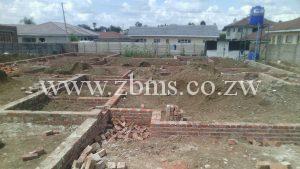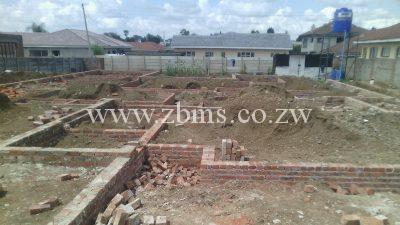box work (foundation)
After completing the first four stages of construction namely site clearing, pre-setting out, trenching and foundation concrete in accordance with house plans, we then move on to the box brickwork. Many people refer to it as foundation brickwork which is among the stages of construction where mistakes are not tolerated since the whole structure is dependent on it. Furthermore care and use of right products is required on these stages. For as long as you are building in urban areas, you need to consult the local council for materials use regulations. In some areas there are certain materials which may not be approved for use for instance, in some areas they don’t allow use of cement blocks.

Required materials for foundation
Now provided that you are through with the first stages, these are the materials required for foundation brickwork.
1. Bricks
Depending on your choice, you can choose the type of brick you want for your foundation. There are various types of bricks that can be used namely semi common hard burn, solid common, cement common, cement blocks, load bearings, smooth industrial et cetera. We chose to begin with bricks because they are the most costly material under this stage.
Note: If you are building double or multi-storey structures, you may not use solid commons and semi commons for this stage. Only load bearings and clinker bricks or other types suggested by your project engineer.
2. Cement
Use of cement may also be regulated by local council. You can choose from the most three common types of cement which is masonry, pc15 and supaset. We recommend use of cement from reputed manufactures like lafarge, PPC and midlands et cetera. PPC has got PMC, UNICEM and Surebuild. All these types of bonds are great for use but depending on area, if wet you use pc15 and supaset and from PPC you use UNICEM and Surebuild. Cement is second on the list according to cost per stage.
Note: For double and multi-storey structures we recommend cement which is 32.5 and above throughout. Using masonry cement may be risky.
3. Pitsand
This does not necessarily have to be a special type. Pitsand is generally the same wherever you are building, only variances in color.
Note: Black soil in pitsand is not okay as it weakens the mortar. Make sure its clean off any black soil.
4. Brickforce
Reinforcement wire is vital and under this stage and depending on bulding by-laws of your area, it may be required at a minimum of after every 2 courses. Its available in various sizes and among them there is 115 and 230 mm brickforce.
Note: There is certainly not a problem if you use it after every 2 courses or less depending on your funds. However notes provided on your house plan will need to be followed.
So for box brickwork in short those are the major four materials, bricks, cement, pitsand, brickforce in Zimbabwe.



